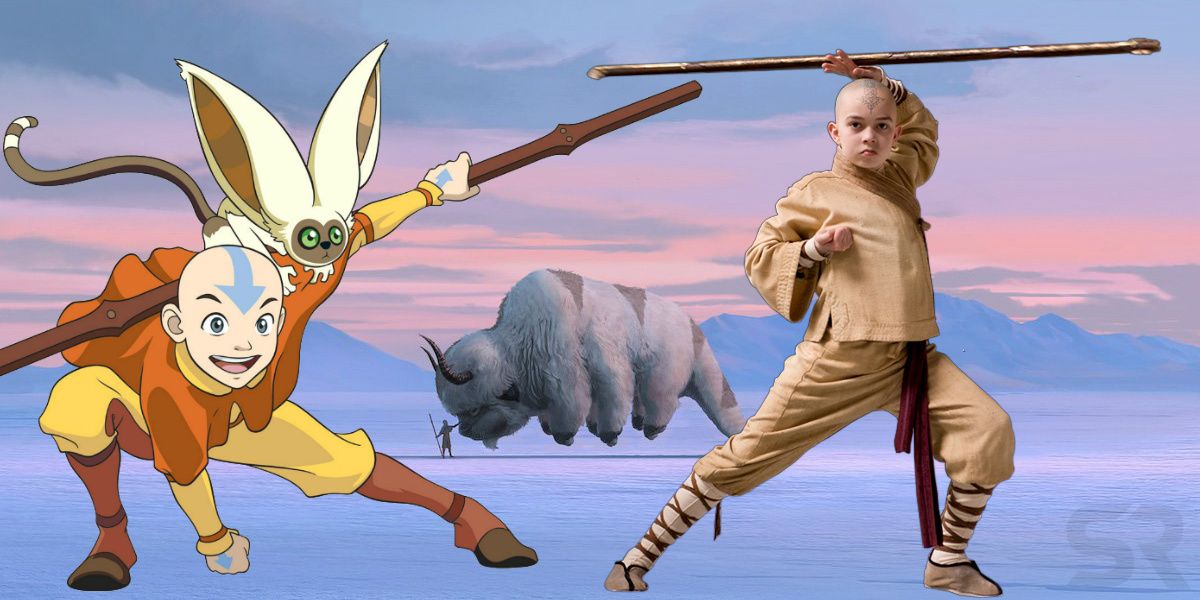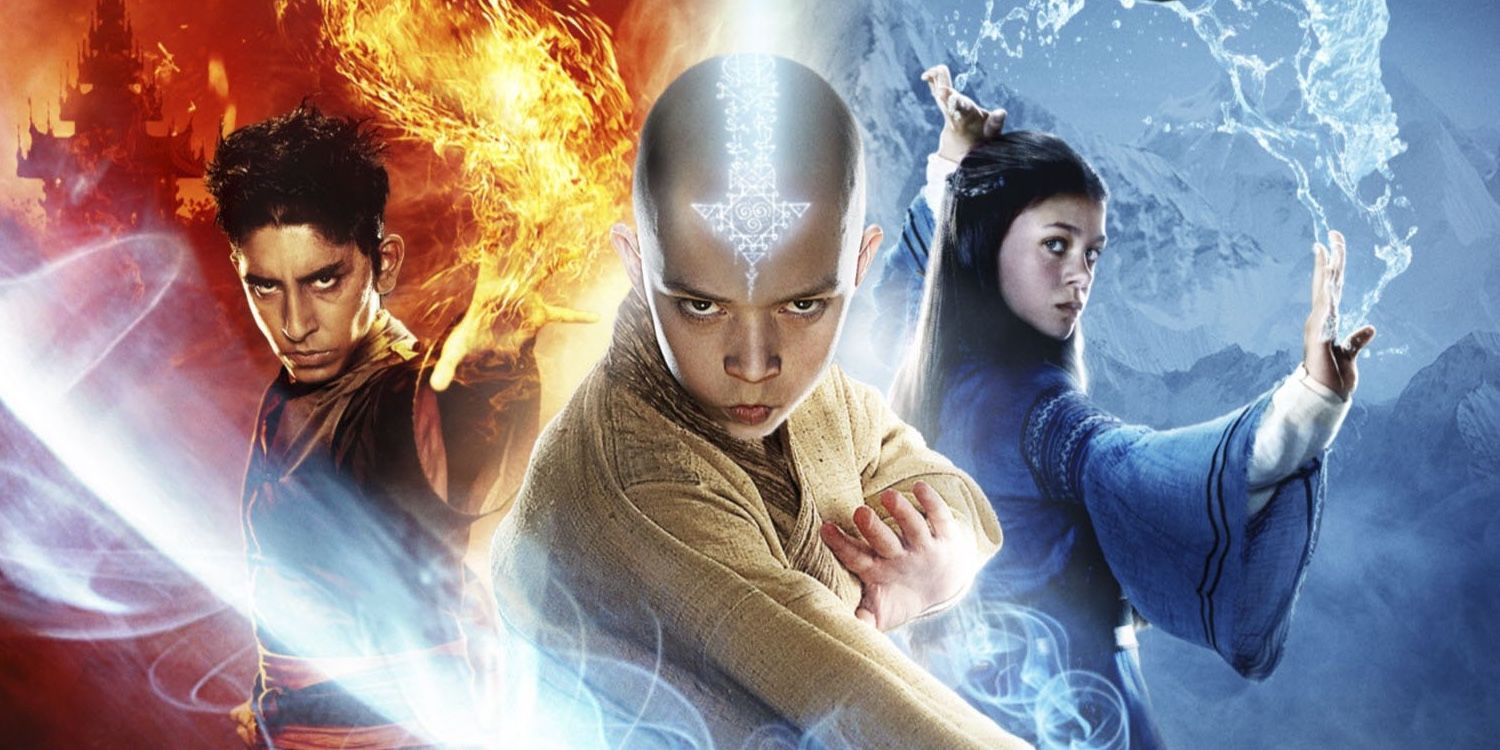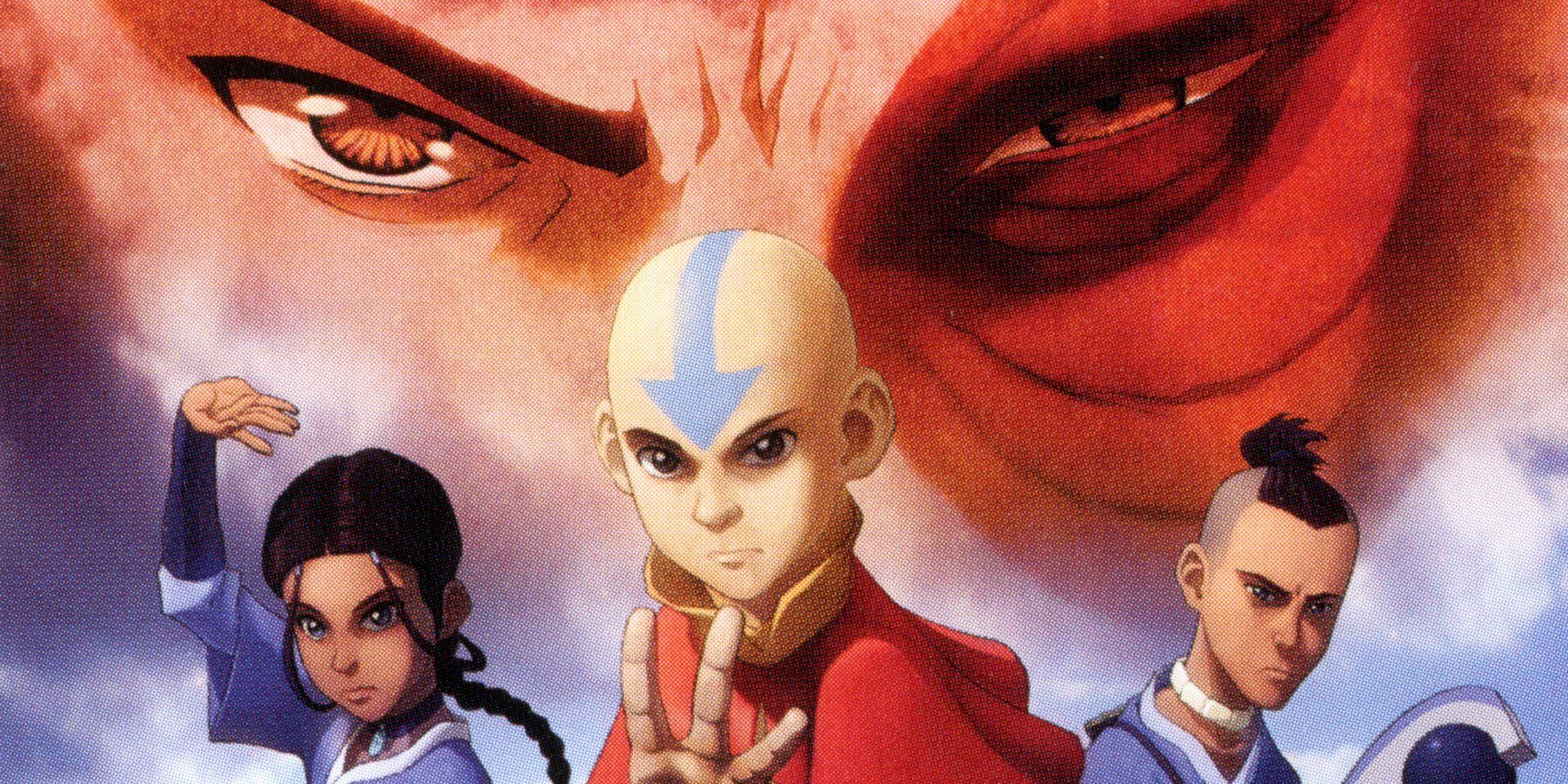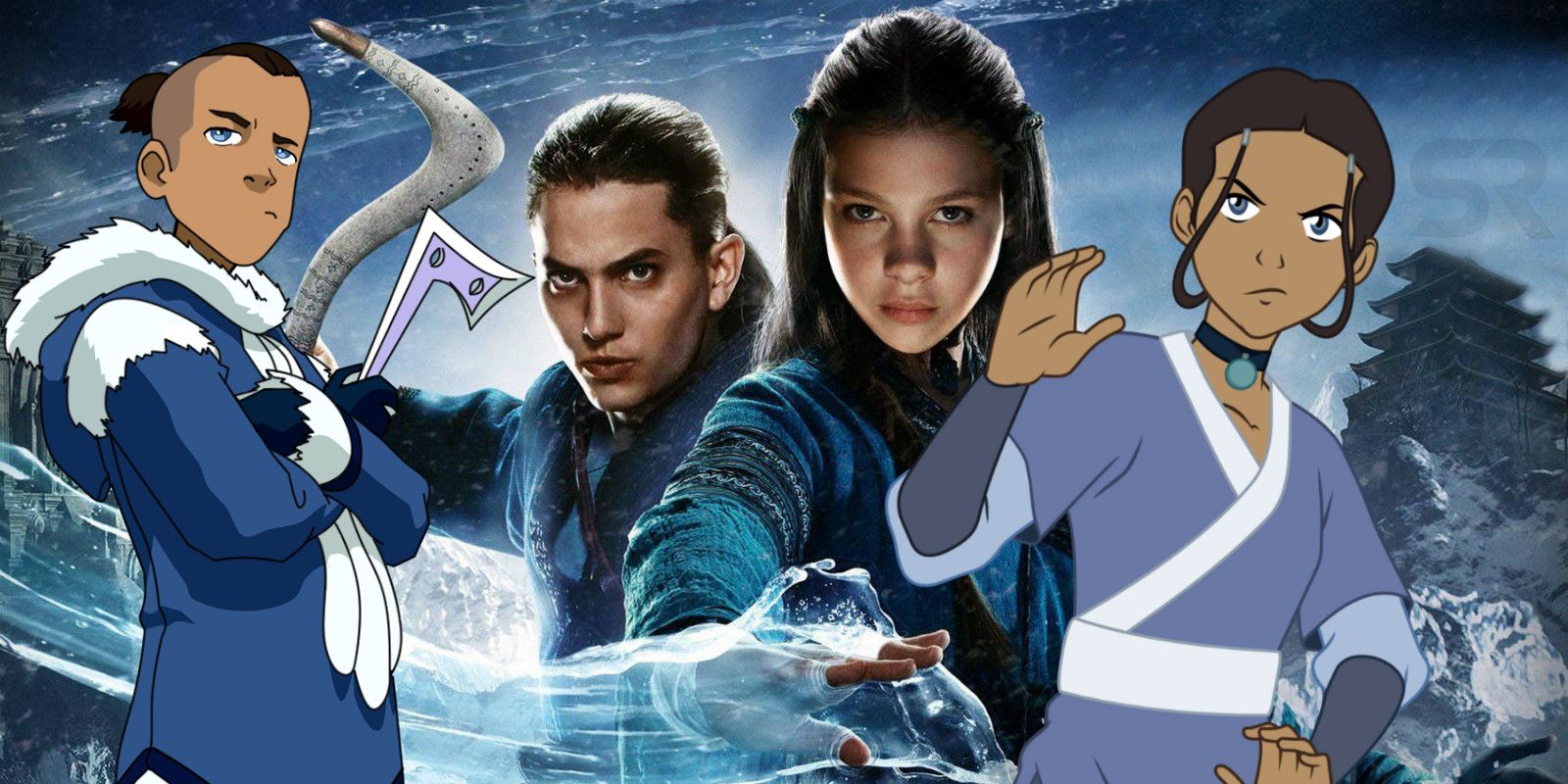Netflix's upcoming live-action Avatar: The Last Airbender TV show has the potential to make up for and be better than M. Night Shyamalan's 2010 movie, The Last Airbender. Premiering on Nickelodeon in 2005, Avatar: The Last Airbender introduced viewers to Aang, Katara and Sokka, three young people living in a world beset by war. Their world is populated by people who can "bend" one of four different elements, becoming Firebenders, Earthbenders, Waterbenders and Airbenders. While Katara is a Waterbender, Aang is the last Airbender and the latest in a long line of powerful benders called the Avatar who has the ability to master all four elements. Much of the show follows Aang as he learns to master the elements and prepare to take on Fire Lord Ozai, the conqueror who seeks to rule the world.
The show was created by Michael DiMartino and Bryan Konietzko, combining elements from American-style cartoons and Japanese anime, with a great deal of influence from Inuit, East Asian and South Asian cultures. Avatar: The Last Airbender ran for three seasons on Nickelodeon, concluding in 2008. Following its conclusion, Shyamalan's The Last Airbender hit theaters in 2010, and was criticized by fans of the show for "racebending" the characters, a term coined specifically for the movie's practice of changing the races of its main characters. The movie also received largely negative reviews from critics and resoundly flopped at the domestic box office with $131 million (on a budget of $150 million), though the movie earned a total of $319 million worldwide.
Related: Screen Rant's The Last Airbender Review
Still, The Last Airbender is widely regarded as a stain on the legacy of Avatar: The Last Airbender, which spawned the spinoff series The Legend of Korra that ran for four seasons on Nickelodeon from 2012-2014. As a result, fans of the original animated show may have been dismayed by news of Netflix developing a live-action Avatar: The Last Airbender series. However, with Konietzko and DiMartino returning as showrunners on the new project, there's hope to be had that Netflix's series will be a worthwhile addition to the Avatar universe. In fact, Netflix's live-action Avatar: The Last Airbender TV show can make up for the failure of Shyamalan's The Last Airbender.
- This Page: The Original Creators Are Involved This Time
- Next Page: TV Adaptation & No Racebending or Whitewashing
The Original Creators Are Involved This Time
Although Konietzko and DiMartino created the property on which Shyamalan's The Last Airbender was based, the duo were not very involved in bringing the movie to life. Neither are listed as producers on the film, they're simply credited for creating the show that the film draws inspiration from. In the years since the movie came out, the pair have spoken about their feelings on it, with Konietzko saying in a 2014 interview with IGN, "I’d like to see it not exist." In another 2014 interview, with the Nerdist Writers Panel podcast, Konietzko elaborated by saying that he and DiMartino didn't want the movie to be done in the first, and if it were to be done, they wanted to be the ones to do it. However, Paramount Pictures recruited M. Night Shyamalan instead and Konietzko said he and DiMartino tried to offer help but they had a "big falling out" with the movie team. Ultimately, Konietzko called The Last Airbender a "wasted opportunity."
All that's to say, Shyamalan and the studio had the resource of consulting the original creators of Avatar: The Last Airbender when adapting the show, but didn't use it. While it's not always necessary for film productions to consult the creators of a source material while adapting it for the big screen, it's not a bad idea either, especially when the property in question is as beloved as Avatar: The Last Airbender. In the end, The Last Airbender came off as a slap in the face of fans of the show, changing important aspects of the universe - including the main characters' races - to suit the studio and director's vision rather than honor the source material. And the end result, the movie itself, wasn't very good, as evidenced by the reviews.
However, Konietzko and DiMartino are not only involved with the Netflix show, they're showrunners on the project, which gives them the same amount of creative control as they had on the original Nickelodeon show. As such, they'll be involved in every step of the adaptation process, bringing the world of Avatar: The Last Airbender to live-action in a way that's much more truthful to the universe than Shyamalan's film - and that includes the format of the new show as well as the way the characters are cast.
Next Page: TV Adaptation & No Racebending or Whitewashing
A TV Show Can Better Adapt Avatar: The Last Airbender Than A Movie
One of the problems with The Last Airbender movie was that it crammed the entirety of Avatar: The Last Airbender's first season into a feature-length film. That's 20 episodes (each roughly 20 minutes in length, equaling about six hours and 40 minutes) boiled down to an hour and 43 minute movie. That's a great deal of paring down in order to fit the story of the first season, which tells of Aang's journey with Katara and Sokka to find a Waterbending master and learn to master the element, into a movie. However, because it's the first season, it's also tasked with a great deal of worldbuilding, establishing why Aang is the last Airbender, what exactly it means for him to be the Avatar, and introducing viewers to the world in which Aang and the other characters live - one in which the Fire Nation has attacked, invaded or conquered all the other nations. As a result, it would have always been a difficult task to adapt the first season into a two hour movie.
But in the case of Netflix's live-action adaptation, it's confirmed to be a series rather than a movie. It's not clear as of this writing how long a season will be or whether they'll retell the same events of the original show's first season over the course of the new project's first season. Netflix shows tend to be anywhere from eight to 13 episodes. If the new live-action Avatar: The Last Airbender series features 13 one-hour episodes a season, that's plenty of room to adapt each of its seasons. But again, it's still very much unclear how exactly Netflix, Konietzko and DiMartino plan to adapt the animated series to a live-action show. Still, no matter how many episodes Netflix grants the new series per season, the TV format will be better suited to retelling Aang's story than a movie, allowing for the creators to take their time in exploring the narrative rather than rush through it.
The Netflix Show Already Promised No Whitewashing
Right out of the gate, in the statement Konietzko and DiMartino released regarding the new Avatar: The Last Airbender Netflix project, the creators assured fans it will feature "a culturally appropriate, non-whitewashed cast." That statement is no doubt a response to the racebending and whitewashing that occured on The Last Airbender. The movie cast three white actors as Aang, Katara and Sokka - Noah Ringer, Nicola Peltz and Jackson Rathbone, respectively - despite the Air Nomads being inspired by Tibetan monks and the Water Tribes being based on the Inuit in the original show. Shyamalan told Syfy Wire in 2010 that (despite its roots in Japanese culture) "Anime is based on ambiguous facial features," and he wanted his movie to be racially diverse.
However, the result was that the three main heroes were played by white actors and the main villain, Fire Nation prince Zuko, was played by an actor of color, Dev Patel. Further, while the main characters were predominantly white, the Water Tribes and Earth Nation scenes were filled in with people of color as extras. This fact pushed the people who inspired the cultures of Avatar: The Last Airbender into the background of what should have been their story. Instead, The Last Airbender became a white savior narrative, featuring white heroes literally saving people of color from another person of color. The film's whitewashing and racebending is one of the biggest, most enduring - and earned - criticisms of Shyamalan's The Last Airbender movie, but the upcoming Netflix series won't do the same.
Since Konietzko and DiMartino are involved in the Netflix project, they're well aware of the Asian and Inuit cultures on which their characters are based. Further, as evidenced by their very first statement about the live-action show, they know many fans' biggest concerns are in the casting of the main characters, and the duo will work to make sure they cast appropriately. Of course, it remains to be seen if that ends up being the case, but it's unlikely DiMartino and Konietzko would have signed on to the project if Netflix didn't agree to casting "culturally appropriate" actors in the show.
Altogether, Netflix's live-action take on Avatar: The Last Airbender is so far set up for success. The TV format allows for more breathing room to adapt the original show's narrative and Konietzko and DiMartino being involved confirms the new project will honor what came before. While it may be some time before the show actually debuts on Netflix, fans can rest assured the new live-action Avatar: The Last Airbender series will make up for the failures of The Last Airbender.
Next: Where Is Netflix The Best Value? Here Are The Cheapest And Most Expensive Countries
Netflix's Avatar: The Last Airbender series starts production in 2019.




